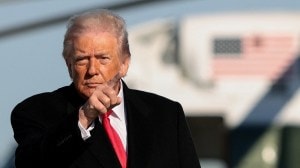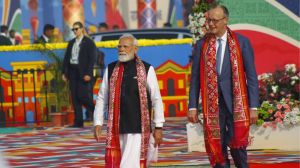Terror against terror
In 8216;Suicide bombers can be stopped8217; IE, August 19, Fareed Zakaria asks the question: What drives suicide bombers not merely to k...

In 8216;Suicide bombers can be stopped8217; IE, August 19, Fareed Zakaria asks the question: What drives suicide bombers not merely to kill but to die? He takes up the question of Russian brutalities in Chechnya which explains the terrorist attacks by Muslim women on Russians. On the other hand, he argues, the terrorist attacks on Turkey by the Kurds subsided after the Turks focused on Kurdish upliftment.
This still does not address the spirit of terrorism. A terroristic imagination is inherent in all of us. The whole play of history and dominance shows the forces of the holy alliance on one side gearing up to put an end to the 8216;evil8217; Other, and the huge elation at the damage to the global superpower symbolised by the collapse of the Twin Towers. For one can easily see superpowers stirring up violence around the world, thereby committing, what Jean Baudrillard calls, 8220;suicide in a blaze of glory8221;. Any power that becomes hegemonic foments deep seated desires of its extermination. Do we not all dream of killing our dominant, oppressive father, an anti-Oedipus trait that looks down upon any 8220;definitive order8221; or 8220;definitive power8221;. Most logically then, Baudrillard goes on to reason in a recent seminar, that 8220;the increase in the power of power heightens the will to destroy it8221;.
Thus suicide bombers are the children of a self-destructive instinct born within the idea of power. The Twin Towers seemingly committed suicide as a response to the suicide planes. The corollary is that it is the West that has relentlessly become suicidal and declared war on itself. And the media goes on playing its role of creating images almost pornographic in their amusement and appeal, which we all simultaneously accept and reject. The display of terrorism becomes the terrorism of exhibition, an impulse to reject any authoritarianism or omnipotence that the superpower represents.
Symbolically, the Twin Towers stood, therefore, for an 8220;internal fragility8221;. Like the computer virus, the painstaking system of any power thus becomes vulnerable at a single point capable of being hit at the roots of its hegemonic system. 8220;When global power dominates the situation to this extent, when there is such a terrifying concentration of all functions in the technocratic machinery, and when no different form of assessment is allowed,8221; Baudrillard argues, 8220;what other way is there but a terroristic situational transfer? It was the system itself which created the objective conditions for this brutal retaliation. By seizing all the cards for itself, it forced the Other to change the rules.8221; It is nothing but 8220;terror against terror8221;.
- 01
- 02
- 03
- 04
- 05































